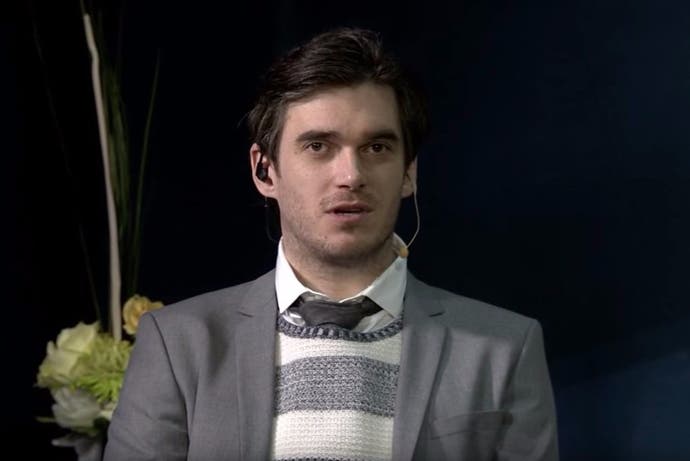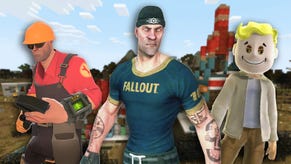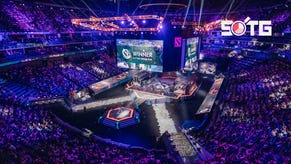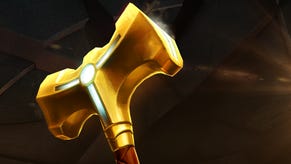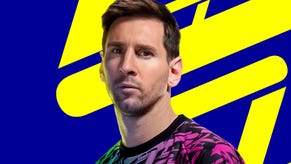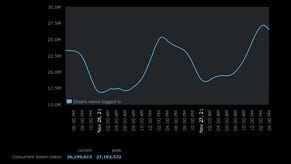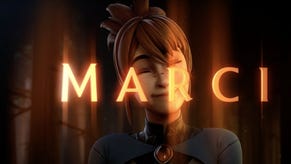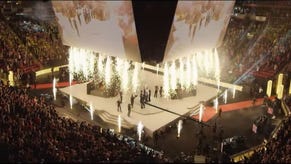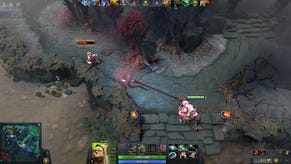Meet the man Gabe Newell called an ass on Reddit
James "2GD" Harding on Dota 2, Diabotical and drama.
Five months ago, Gabe Newell, perhaps the most beloved video game developer on the planet, called James "2GD" Harding an ass on Reddit.
That was that, you thought of Harding's career in the video game industry. Not so.
Harding has just launched a successful Kickstarter for a game of his own. Diabotical, described as a fast-paced multiplayer arena first-person shooter, has at the time of publication raised £135,000 from over 5000 backers. It's already smashed its £110,000 goal with 14 days remaining.
It's a far cry from the day Harding woke up in a hotel room in China to find the internet ablaze, fuelled by a quite astonishing comment from Gabe Newell himself.
I interview Harding on the eve of Diabotical's funding success. He speaks with the confidence of someone who knows what his own voice sounds like - and isn't afraid to use it. And there's a cockiness there, an underlying arrogance buoyed by an ego not dented by Gabe Newell's jibe - more swelled by it.
33-year-old James Harding is nowadays perhaps best known for hosting high-profile Dota 2 tournaments, but he made his name by being brilliant at first-person shooters - Quake in particular.
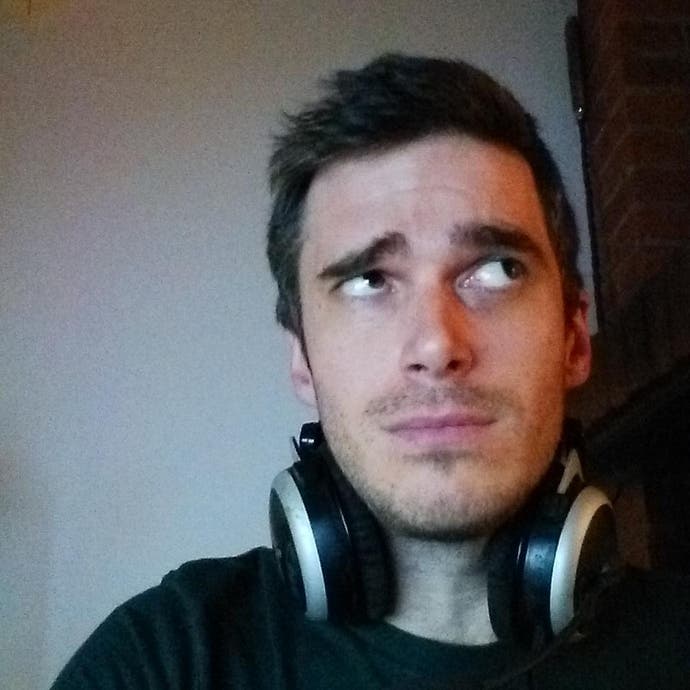
His talent for the game emerged back in the late '90s, when Harding would hole himself up in his bedroom in the family home in Glastonbury, Somerset, and put countless hours into id Software's hugely popular shooter.
Glastonbury, Harding tells me over Skype, was a boring place to be a teenager. "When I got internet back in Glastonbury I think people in the town thought it was some sort of sorcery," he chuckles.
Harding, the middle of three brothers, remembers the time his father brought some computers home from a company that had gone bust. On one was Prince of Persia. He remembers answering Leisure Suit Larry's infamous age verification questions at nine years old. Harding's competitive gaming streak can be traced back to Street Fighter 2 on the Super Nintendo. He would host tournaments with friends, although, he says, most would end up with he as Ken, versus his older brother as Guile in the final.
The move to PC gaming was sparked by a knee injury that put an end to sport at school. So, Harding's grandparents took some money out of Post Office savings to fund his first gaming PC. Wide-eyed with wonder, Harding sought out online video games for the first time, discovering the likes of MechCommander and Quake.
Harding played Quake 2 unlike most. Because he was so used to playing seminal shooter GoldenEye with the Nintendo 64's analogue controller, he played Quake 2 in a sort of co-op way with his friend. He would use a joypad with an analogue stick to strafe left and right, and the mouse to aim. "I'd have to tell my mate Steve that I needed the rocket launcher and he'd press number five on the keyboard, and I'd be like, thanks Steve."
It was not the kind of control scheme befitting one of the world's best Quake players, but it worked well enough for Harding to fall in love with the game. He worked on a website that would help players challenge others to matches. Back then, Quake players on the hunt for competition would find themselves on websites packed with spinning skull gifs. There they would run into players called something like slayer666. And then you'd challenge them over email or a message board. "It was fun," Harding remembers.
It wasn't until the 1999 release of Quake 3 Arena that Harding "got serious" about playing the game. Inspired by tournaments cast on GTV, software that would let viewers watch competitive gaming matches, Harding had a burning desire to play Quake professionally, if such a thing could be done. "With me, there was nothing other than competitive gaming and eSports," he says.
Like so many video game fans of his generation, Harding would go to LAN parties when really he should have been studying. When his University of Gloucestershire friends would ask him if he fancied going to the pub, he'd have to catch up with them later because he'd have a Quake match to play first.
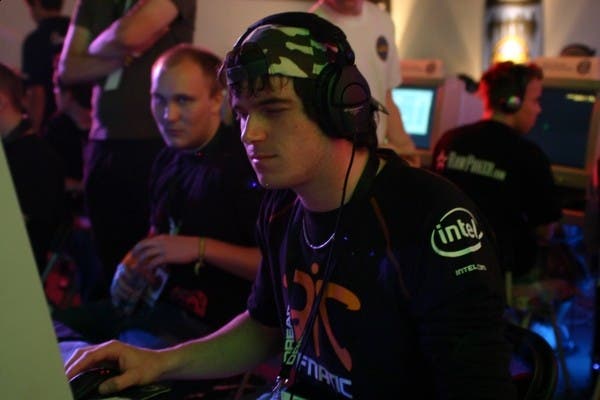
Coming out of university, Quake 3 was on the slide. There were few tournaments, Harding remembers. Broke and living with his mum, Harding found the pressure was on to get a "proper job". "I was like, 'yep,' but then she'd walk past my bedroom and see me playing video games and would say, 'you'll never get a job playing video games.' I was like, 'okay.'"
Harding stuck with Quake and tried to make a go of it. Early highlights include playing for England at the eSports World Convention (ESWC) in France, but still, the competitive scene around the game at the time was flagging. "There was more and more pressure from my mum, and I was getting part-time jobs in factories," he says.
"Coming out of university and wanting to do something with gaming, I could see it was on the rise. There was the ESWC, the Cyberathlete Professional League (CPL), and you had Dreamhack. There were people doing stuff, but it wasn't sustainable."
Things really got going for Harding when Quake 4 came out in 2005. "I said to myself, when Quake 4 comes out I'm going to be one of the top pros."
Harding attended a Quake 4 tournament in the US and scored seventh place, winning a few thousand dollars in the process. It was the kickstart his professional gaming career needed. "All of a sudden things got a lot easier at home," he says. "My mum, if she ever walked past my bedroom and saw me watching TV and not playing video games, she would be like, 'you're not going to win a tournament watching TV.' It definitely changed."
After his early days Quake success, Harding was picked up by Team Dignitas, one of the most famous eSports teams of the time. Harding became Quake's first officially transferred player when in 2004 he left Dignitas for Fnatic. Fnatic, he says, bought Harding out of the remainder of his contract with Dignitas, so keen were they to secure his services.
The career of an eSports star is often short-lived. The best of the best burn brightly in their teens and early twenties, then fizzle as they approach their mid-twenties. So it proved for Harding.
Unlike many eSports stars, however, Harding successfully navigated the transition from playing games for a living to commentating on them for a living. This transition began after Harding found himself helping teammates out with logistical problems. He eventually became Fnatic team manager. When he was made Fnatic general manager he worked with sponsors and, he says, learnt a lot about business.
Harding left Fnatic to do work on eSports shows at ESL in Germany. "I wanted to try and tell the stories of the other pro gamers, the best we could," he says.
This gets to the heart, I think, of what makes Harding tick. His video game commentary career seems born from a desire to do things better than they have been done in the past. Harding thought the way to make eSports as big as it could possibly be was to focus on telling stories about what was happening on-screen and how incredible the players were. Whether it was for shooters or massively multiplayer online role-playing games, the approach was the same: eSports should be about personalities.
This approach also, I think, strikes at a possible reason Harding sometimes comes across as, as Newell put it, "an ass". Harding admits he came into ESL and ruffled feathers. And he's not shy to suggest he showed his German colleagues how it's done.
"We produced the best results they'd ever had," Harding says. "It was very different and shocking for them. We started to make waves in the community, bringing these personalities from behind the screen to life through stories, then ESL were getting them into the studios and bringing them over for LANs.
"We were doing live interviews. Before that there was very little focus on the stories of the players. It started changing, not just at ESL TV but at other companies."
Harding left ESL in 2010 under a cloud. I've heard his exit from the eSports company described as a personality clash, but Harding puts it down to that old chestnut, the "creative difference".
"At the time we were doing a lot of good stuff, but I wanted to do more," he says. "I would produce great results. I always felt I delivered."
Harding wanted to cover more games, such as MOBA Heroes of Newerth, and cover them in a way that was more community-focused than ESL was used to. He wanted to put the presenters, that is, himself and THE other hosts and casters, front and centre. "I asked them if I could do it and they felt like by myself I wouldn't be able to pull it off," Harding says.
"I was like, what? Are you kidding? I've designed some of your most successful shows. I've designed formats for tournaments that are much more interesting than the formats you previously used. They challenged me in the sense that I wasn't capable, and I thought they were so incredibly wrong.
"I remember the head of ESL TV told me, it's 80 per cent game, 20 per cent commentators. I was just like, you are so incredibly wrong. The commentators are so much different than sports personalities because they get so much more screen time.
"I had a disagreement about what they were doing. So I was like, okay, if you don't want me to do more work at your studio, I'm going to buy a streaming PC, set up a channel at my house and cover tournaments you don't think we have time for here."
It was the end of Harding's time at ESL, but the beginning of what would become Harding's journey towards Diabotical.
Harding came across a game called Bloodline Champions, suggested to him from the World of Warcraft community. Bloodline Champions, released in 2011, is a free-to-play MOBA made by a small Swedish studio called Stunlock. Harding loved it. "I played it and was like, okay, this is so legit," he says. "This ticks so many boxes in terms of what it's capable of being as an eSport, and it was very fun."
Harding approached the development team and eventually left Germany to join them in Sweden to work on the eSports side of the game. "It did very well overall," he says. "There were ups and downs and mistakes were made."
It was in late 2011 that Harding started The GD Studio with just $20,000. The idea, he freely admits, was to create a way of covering eSports that "would actually challenge ESL TV". The focus was on the community, was on creating a rapport with viewers, was on a raw, real feel. From the basement of a house in Sweden, The GD Studio became an instant internet hit.
Through The GD Show, Harding gained a reputation as an offensive, sweary, whiskey-drinking "real talk" eSports show host. The video, below, gives you an idea of the Harding style. Be warned: it's definitely NSFW.
"We were people's place to watch eSports because it was laid back," Harding says. "It was fun, it was entertaining and the games were great and it was honest and truthful and it wasn't stiff, and it was what I felt ESL weren't understanding at the time."
The GD Studio covered the likes of Quake Live, StarCraft 2, Dota 2 and Bloodline Champions, but it wasn't long before the popularity of some of the games Harding specialised in, such as Quake, declined. ESL signed an exclusivity deal with Blizzard for StarCraft 2, forcing one member of The GD Studio to move to its big budget rival.
But Harding had grander ambitions for The GD Studio. Even then, he wanted it to develop a video game. Early production began on a project codenamed Reborn. As The GD Studio's eSports fan club wound down, development ramped up. "Through that development, I promised myself we would do it, make the mistakes early when it doesn't cost anything," Harding says. Reborn would eventually become Diabotical.
Harding attended the first The International Dota 2 tournament at Gamescom in Germany in 2011 as a punter, and watched Gabe Newell hand winning team Na'Vi a cheque for $1m. Harding says he was recommended as a potential host for TI2, based on his work at The GD Studio. Apparently IceFrog, the secretive brains behind Dota 2, said no - at first. But someone twisted his arm.
"In a way, Valve didn't really know what they wanted on camera," Harding says. It seems that for TI2, Harding was afforded the opportunity to tailor the presentation. He pulled Bruno Carlucci, Valve's Dota 2 statistician, from behind the camera to in front of it. Why? "He was wearing a weird suit and hat," Harding explains. Bruno and Harding got on like a house on fire, and the relationship blossomed on-screen. Viewers loved them.
James Harding came out of semi-commentating retirement to host Valve's Shanghai Major Dota 2 tournament in March 2016. Perhaps mindful of this, Harding had told Valve he'd probably need to do something "a little bit Jamesey" to signal his return.
The hosting session that got Harding fired began with a joke about porn. Harding would go on to encourage criticism of the players themselves. You can see it all in the video below. It's clear from his post on Reddit, that Valve boss Gabe Newell was not pleased.
Harding described the incident in great detail in a stream of consciousness essay titled "James is an ass - by James Harding", so we won't spend too much time on the minutiae here. In summary, Harding was fired, was upset, was asked to sleep on it before responding on the internet, then woke to a storm.
"They asked me if I'd sleep on it and would I go back on the show," Harding remembers.
"I said, yeah, I'll go to bed and sleep on the situation. They said, is it possible you would go back on the show? I went to sleep. I woke up and I've got all these messages, and I read it, and I'm just like... he doesn't know who I am. I was like, what? What?! It was insane.
"And then I was just like, okay, what the hell? I just got called an ass, and people having problems with me in the past by one of the most reputable - apparently - gaming figures in the industry, who I couldn't remember the two times I think I met him."
Speaking to me now, Harding remembers the two times he met Gabe Newell. The first was to have a photograph signed while he hosted The International ("I made Bruno queue for it because I wanted to watch the Dota 2 game. He'd go in a queue for 30 minutes to get a picture with Gabe, I'd jump in with him and then we'd do it together, and then I'd fill him in on what happened with the Dota 2 match so when we came back on camera we'd both have something good to say to the audience.").
During the second meeting, which happened at TI3, Harding chatted briefly with Newell, congratulating him on Valve's success. "Essentially you've surrounded yourself with fantastic people who are looking into this side of the industry, eSports, and trying to figure out what's happening," Harding told Newell.
"He was like yeah, and asked me how the on-camera stuff was going. He asked me if I had any inspirations. I was like blah blah blah and I left. It was fine."
(Newell did not respond to a request for more information from Eurogamer).
"So when I got this news I was like, this guy doesn't know me. What the hell's going on?"
Harding hasn't spoken with Newell about his sacking, so he doesn't know why he was fired, but he has a theory.
He believes it had a lot to do with his criticism of Dota 2 players. Now, anyone who's watched sports coverage on telly will know commentators and hosts can be savage at times. But in the world of eSports, singling out players for criticism is a bit of a no-no. The discussion revolves around how the game plays, how the heroes play, tactics, map design, and getting very very excited when players clash.
Harding, in a bid to spice things up a bit, encouraged the panel to criticise some of the Dota 2 players at the tournament. This, he believes, annoyed Newell, who felt it was disrespectful.
"A lot of people are often very nice, and they talk about the meta of the game," Harding says.
"I'm like, guys, if you keep saying this hero and this hero, it's really boring. Could you please start using players' names? And if they're great, you're more than welcome to tell everybody how great they are. And if they're bad, don't feel bad. I know you know the players and you're friends with them, but if they really sucked, it's okay to say they were awful in that game.
"People still didn't feel comfortable doing this. So when I went into the segment that really got some people upset, I called out a player saying, he's never going to win a tournament. I wanted to just purposely have an opinion on him that was so strong so that the other four panellists would literally just be like, you are so wrong! And they would start getting passionate and be like, he can win tournaments, he has done this, and he's awesome.
"So the people at home would be like, okay, this player sounds really interesting, these guys are passionate about this conversation, I'm interested now just to see the grand finals, if this player is in it to see if he wins or loses. And it turned out that player won, and everyone came to me and said, LOL you were wrong. And I was like, well, you don't actually know what I was trying to do. I also think he can win, but I was just trying to get the most out of the panel in a discussion. Pushing it that way, some people thought it was disrespectful to players.
"That was about keeping them entertained for an hour, which is essentially Valve's money. The customer's money also for pulling in money into the Compendium - as opposed to showing them a blue screen."
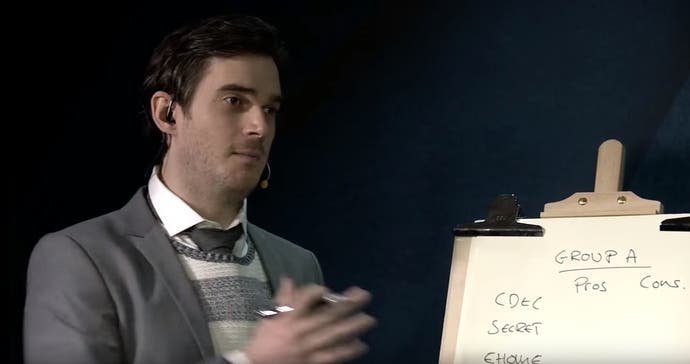
Talking to Harding, I imagine him as Marty McFly, flying around on-stage with a Johnny B. Goode guitar solo that stuns the 1955 high school dance audience into silence. "I guess you guys aren't ready for that yet," Marty says as he hands over the guitar. "But your kids are gonna love it."
"What I did on camera was, you know, it was pushing the bar, but it was by no means unacceptable compared to the past," Harding insists.
"Even before I got hired I had a conversation where I said to Valve, you know I've been off camera for over a year and a half? So if I come back I probably need to do something a little bit Jamesey, and then I'll start toning it down. And then by the time of the finals I'll make sure we run a nice clean and entertaining set you can use in future footage. So, they kind of agreed that I got to be me.
"So when that happened I think it was just the case that he was maybe out of the loop, and he took it upon himself. I still haven't had any contact with them, or unfortunately been paid for that event."
Harding tells me he runs up against a lot of people who want him to fail. He says his profile puts him in the spotlight. But, he says, it's this hate that drives him. "I'm not scared of what's next," he says, defiantly.
In James Harding an ass? Watching the video of the session that got him fired, I think it's easy to see why some would agree with Gabe Newell's assessment. Harding, to his credit, isn't afraid to admit his failings.
"There's always some truth in what people say," he says. "So yeah, I am probably a bit of an ass, in Gabe's defense."
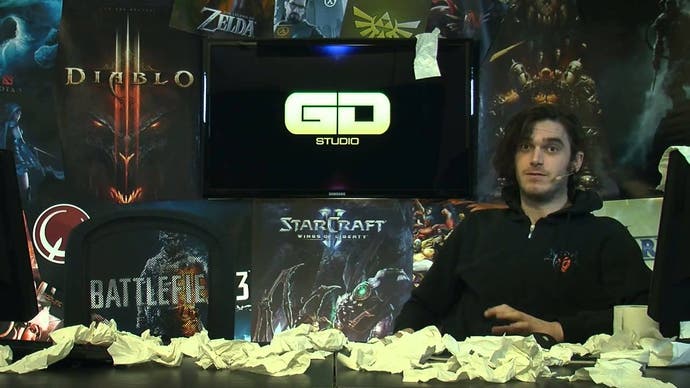
This is Harding's style. In his attempt to connect with the wider eSports community, he needs to relate to them. Harding is a reflection of the eSports community. The audience enjoy watching him because he's one of them.
In his own words, he likes raising an eyebrow. He describes his style as "a bit like Ricky Gervais at the Golden Globes but not as funny".
"It's tailored to the community," he continues.
"Hopefully if I'm doing it correctly it will make people laugh and keep them entertained, which is what everyone wants when they spend a lot of time watching a tournament."
Any regrets? "I don't have any regrets about how I hosted the event," Harding counters. "And I don't have any hard feelings towards Valve. It's just an unfortunate situation hopefully we both learn from. We continue on our ways.
"He's [Newell] probably a really nice guy. I just think the whole situation was a bit surreal and somewhat funny.
"It's going to be fascinating if I get to meet him again in person. I'm so looking forward to that. I don't know which way it's going to go."
Harding skipped this year's The International, which saw an eye-watering $20m prize pot - the biggest ever for an eSports tournament. He says he was busy with the Diabotical Kickstarter, but also that he didn't want to cause a fuss.
"If I go to Valve, there's always this kind of like, I'm there and I'm just this entity, you know?" he says. "I'm just a reminder of that situation that probably people don't really need to talk about while they're working really hard at The International."
Do you consider the situation resolved, then?
"I guess in many ways it's not really resolved. No-one's talked to me about it from the company. But in a way it is resolved, just by not talking about it. I don't want to cause any drama."
If a video game publisher calls into question your professionalism in public, you'd think it would seriously impact your ability to do business. But if Gabe Newell himself calls you an ass on Reddit, your reputation, you'd think, would be left in tatters.
Harding says one potential investor in Diabotical went mysteriously quiet after the incident, but apart from that, there's been little knock-on effect on the Kickstarter. Perhaps that's because he's dealing with his fans directly, rekindling memories of the glory days of arena shooters, tapping into nostalgia for The GD Studio and its coverage of Quake. "I haven't gone out there to work with a lot of people," he says. "Mainly we're just talking to the community."
It's clear that while Harding can often come across badly on-screen, he's taking the development of Diabotical incredibly seriously. He has big ideas for the game and the way eSports can evolve alongside it. He is as bold as to suggest that his work on Diabotical may change the way the industry runs eSports events forever.
This is the push and pull of Harding's personality. On-screen he is Marmite. He's either the funniest guy in eSports or the most annoying. Off-screen he is a fiendishly ambitious and confident video game developer.
"There's two reputations of me," Harding says.
"The one I find really funny is, if you don't know me personally, or worked with me on a professional level, from the outside looking in you go, what the hell is going on, because there's an on-camera presence and stories that go round that I hear and I'm like, wow, that's a new story, fantastic. There are definitely people who are cautious.
"Then, if you work with me on a professional level and understand how much I put into eSports or any project that has a chance of letting people down or not, I'm always like, no, we do the most. We push the hardest we can. I'm always the first person to sit down at the desk of a panel, if I'm a host. I'll shout at the other guys to turn up and get ready with their headsets on.
"So there are two very different extremes of me. I guess I can't say which one I am more or not. You have to get to know me to really understand."
The Diabotical Kickstarter trades off of Harding's reputation as a bit of an eSports badboy. It even references his firing by Valve and Newell's very public insult.
"He threw me a bit of a bone, I guess," Harding says, turning the narrative on its head. "I'm not going to lie. But that was his call, right? It's more just having fun with it."
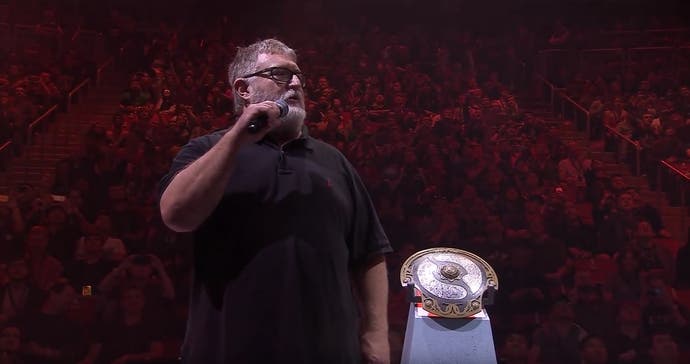
Now that Diabotical has been a Kickstarter success, Harding faces the prospect of having to secure a release on Steam. Steam's near monopoly on PC game sales means it's the place to be, unless you're Blizzard. The GD Studio is not Blizzard. It needs to be on Steam.
But Gaben? "So many people I know at Valve, they're just so nice," Harding says, diplomatically. "If the game's good, why shouldn't it be on Steam? Let's assume that it is, okay, and we'll take another conversation if it isn't."
Harding wants to leave the drama with Gabe Newell behind to focus on Diabotical, but he's clued up enough to know it's an incident that will dog him for years to come. He mentions to me that he knew it would come up and is happy to talk about it, which I respect. Better to face the beast than to cower.
Throughout our interview, Harding has been quick to reply to my questions. It's not until I ask him how he would describe himself that there's a pause long enough for me to wonder if he's stumped.
"Someone who loves creating and building awesome things in their own way, not only a product but helpful to certain groups of people," Harding eventually replies.
"I give a shit. That's me. I actually give a shit."
